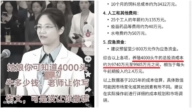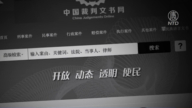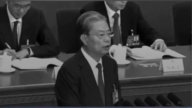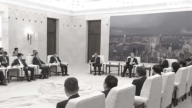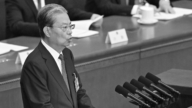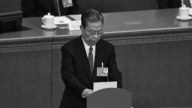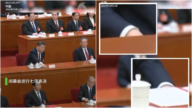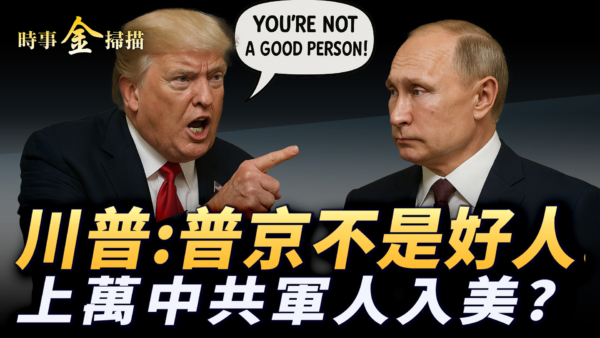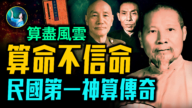【新唐人2013年03月18日讯】3月16号,中共的人大投票,表决了政府组成人员名单。这份名单由新任的总理李克强提交。而其中,环保部部长周生贤得到最低票数。在投票表决环境与资源保护委员会主委相关名单时,更是出现罕见景象。有超过3成的代表,对这份名单草案投下反对和弃权票。这是否是民意的反映呢?一起来听听专家的评论分析。
李克强向大会提交的表决名单包括4名副总理, 5名国务委员和25名部级领导人的人选。
大会公布的表决结果显示,一共有4人得票低于2800张,分别是环境保护部部长周生贤,住房和城乡建设部长姜伟新,中国人民银行行长周小川,和教育部部长袁贵仁。他们被网民讽刺为四大“反对票票王”部长。
其中,得票最低的环境保护部部长周生贤,只得到2734张赞成票,反对和弃权票达到171票和47票。
这次人大会议召开前夕,中国各大城市的雾霾天气成为无法逃避的话题。而会议过程中,通过河流向上海漂去的数近万头死猪,更激起了民众的愤怒。
有分析认为,被称为“橡皮图章”的人大,向周生贤投出如此大量的反对票和弃权票,是目前中国大陆环境污染状况不断恶化和升级的直接结果。
时事评论员司马泰:“能够投反对票这本身是个好现象。但是如果共产党通过这种方式来玩这种所谓的党内民主,来应付外界的对中共政治民主化制度的一种拖延,敷衍和搪塞:我们先搞党内民主。是非常危险的。因为它这种党内民主就是党内政治斗争,变成了一个党内集团利益的工具。”
会议在表决环境与资源保护委员会主任委员、副主任委员、和委员等名单草案时,更出现850反对票,125弃权票,另有15人未按表决器的罕见景象。草案最终以1969票赞成,勉强通过。超过3成代表反对和弃权。当会场大屏幕显示这样的结果时,引发台下一阵轰动。
时事评论员任百鸣:“实际上他也知道环境保护也不光是环保部门说了算的,往往都是当地的这些官员,他们从实际的利益出发,进行环境和各个方面的破坏。但是这些代表们就借这个机会,发泄这样的不满。实际上这个跟民主还差的很远,因为里面很多东西都是事先拟定的。”
时事评论员任百鸣还指出,大量反对票出现的一个实质原因是:目前中共没有一个绝对的权力核心人物,党内分化明显。
任百鸣:“它当然不可能反映出民意,因为中共一党专制是一个根本的东西,它从来也不会改变。它只不过就是在目前的这种政坛的乱象、权力的内斗,以及现在社会上各种,很多很危急的因素,纷纷表露出来以后,所以各种各样的声音就迫不得已的发出来。所以是内外结合和社会动荡的一种反映。”
在此之前,李源潮当选为中共国家副主席,但反对及弃权票多达80张和37张。中共中央统战部长令计划在选举新一届政协副主席时,也得到了90张反对票和22张弃权票。
台湾《中央社》报导认为,这些派系特征明显的领导人,获得高反对票和弃权票,显示出表面和谐的中共政坛,在台面下的权力斗争,从来没有平息过。
采访/常春 编辑/李明飞 后制/萧宇
30% of Representatives Vote Against the Environmental Protection Committee
On March 16, the Party’s National Congress voted on
the members of China’s government.
The candidate name list was turned in by Li Keqiang.
Among all candidates, Zhou Shengxian,
Minister of the Department of Environmental Protection,
was the bottom candidate.
It was rare to see 30% of representatives cast dissenting
votes or abstention votes for the members of Environment and Resources Protection Committee.
Is this phenomenon the reflection of public opinion?
Li Keqiang turned in a candidate list for 4 Vice Premiers,
5 State Council members and 25 Ministers.
Based on voting results, 4 candidates got
less than 2,800 votes.
They are Zhou Shengxian, Minister of the
Department of Environmental Protection;
Jiang Weixin, Minister of the Department of Housing
and Municipal and Rural Construction;
Zhou Xiaochuan, Governor of People’s Bank of China and
Yuan Guiren, Minister of Department of Education.
The bottom candidate is Zhou Shengxian, Minister of
the Department of Environment Protection.
Zhou got 2,734 consenting votes,
171 dissenting votes, and 47 abstention votes.
Right before the 18th National Congress, severely polluted
air of big cities in China became an unavoidable topic.
The National Congress has been called a “rubber stamp"congress.
However, this time Zhou Shengxian got this many dissenting votes.
Some analysts think that it reflects the fact that
environmental pollution in China has become severe.
Commentator Sima Tai:"It’s a good sign that
dissenting votes are allowed.
Nevertheless, if the Party tries to play internal democracy
to procrastinate the realization of democratization in China, this will be dangerous.
The party’s internal democracy is nothing but a tool that
factions use to enhance their own interest."
In the voting for Director, Associate Director and board
members of the Environment and Resources Protection Committee,
there were 850 dissenting votes and 125 abstention votes.
15 people didn’t push any button for their votes. In the end,
the draft was barely passed with 1,969 consent votes.
Over 30% of representatives were against the draft or
waived their voting right.
Commentator Ren Baiming:"As a matter of fact,
everyone knows that protection is not only up to the Department of Environmental Protection.
Most of the time, it is down to those local officials who
themselves caused the deterioration of the environment in pursuit of their own benefits.
The congress representatives were only taking the chance
to show their dissatisfaction, which is in no way related to democracy.
In fact, a lot of things that happened in the congress
were predetermined."
Ren Baiming also stated another reason for
the many dissenting votes.
That is, the Party doesn’t have a core leader with
absolute power, so the Party is as if disintegrated.
Ren Baiming: “The voting cannot demonstrate
any public opinion at all.
The Chinese Communist Party is a one-party dictatorship
and this fact has never changed.
Nowadays, due to political chaos, faction conflicts and
various social problems and perils, all kind of voices for different issues are made.
Therefore, discontent opinions are not a demonstration of
democracy, but of social turbulence."
Earlier, When Li Yuanchao was elected Vice Chairman,
he got 80 dissenting votes and 37 abstention votes.
When Ling Jihua was elected as Vice Chairman of Political Bureau,
he got 90 dissenting votes and 22 abstention votes.
Taiwan’s “Central New Agency"stated that it only superficially
shows political harmony when some leaders got many dissenting and abstention votes.
However, the faction conflicts behind the scenes
have never stopped.
‘


